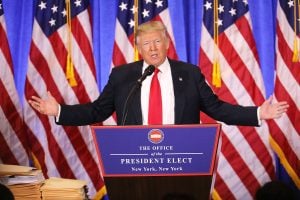[ad_1]

(Photo by Spencer Platt/Getty Images)
E. Jean Carroll would like her $83 million dollars, please.
On January 26, a jury in Manhattan returned its verdict in the advice columnist’s second defamation trial against the former president. The court entered its judgment on February 8, starting the clock for the 30-day automatic stay of judgment under Rule 62. If Trump fails to post a bond of $91.6 million, or get the bond requirement stayed by March 9, Carroll will be able to immediately begin collecting.
And yet it took the defendant until Saturday to get around to asking the court for an “an unsecured stay of the execution of the Court’s February 8, 2024, judgment, ECF No. 285, until 30 days after the resolution of President Trump’s post-trial motions under Rules 50 and 59 of the Federal Rules of Civil Procedure, which will be filed no later than March 7, 2024.”
Alternatively, he’d like to “post a bond in an appropriate fraction of the amount of the judgment” — maybe $91.60! — while he tries to convince the court to overturn the jury’s verdict.
Trump argues that the bond requirement should be waived in light of the “strong probability that the disposition of post-trial motions will substantially reduce, if not eliminate, the amount of the judgment.” This is probably news to Judge Lewis Kaplan, who spent four years dealing with Trump and his sparklemagic lawyer Alina Habba, and has shown absolutely no inclination to give her or her client an inch.
Trump’s lawyers also make the very odd argument that a punitive-to-compensatory ratio of 3.6:1 is “excessive” and likely to be overturned by the trial judge or on appeal. They also protest that their client’s behavior was not “uniquely egregious,” conveniently omitting to mention the hundreds of social media attacks he lobbed at Carroll, repeating the defamatory statements online even as he sat in the courtroom.
But the best part is Trump’s claim that he’s so rich that he should be spared the ignominy of having to post a bond.
“Having argued to the jury that President Trump has great financial resources, Plaintiff is in no position to contradict herself now and contend that she requires the protection of a bond during the brief period while post-trial motions are pending,” he huffs. “This fact nullifies risk to the judgment creditor and weighs heavily in favor of an unsecured stay.”
He then immediately turns around and argues that, despite his vast wealth, having to post a bond would constitute irreparable injury.
“Here, under this district’s common practice of requiring a bond of 110 percent of the judgment, President Trump faces the prospect of posting a bond of $91.63 million—a sizeable bond which will come with very substantial, non-recoverable financial costs,” he moans. “These costs plainly constitute irreparable injury.”
Judge Kaplan was mad impressed. Or maybe just mad.
Twenty-five days after the jury verdict in this case, and only shortly before the expiration of Rule 62’s automatic stay of enforcement of the judgment, Mr. Trump has moved for an “administrative stay” of enforcement pending the filing and disposition of any post-trial motions that he may file. He seeks that relief without posting any security.
The Court declines to grant any stay, much less an unsecured stay, without first having afforded plaintiff a meaningful opportunity to be heard.
Plaintiff shall file any response to defendant’s motion (Dkt 286) no later than 5:00 p.m. on February 29, 2024. Any reply shall be filed no later than 5:00 p.m. on March 2, 2024.
Seems like the judge is not super receptive to the suggestion that there’s a “strong probability” he’s about to undo the jury’s verdict. Wonder if Carroll will be able to come up with any reason she might be prejudiced if Trump is allowed to waive posting bond …
Carroll v. Trump [Docket via Court Listener]
Liz Dye lives in Baltimore where she produces the Law and Chaos substack and podcast.
[ad_2]




